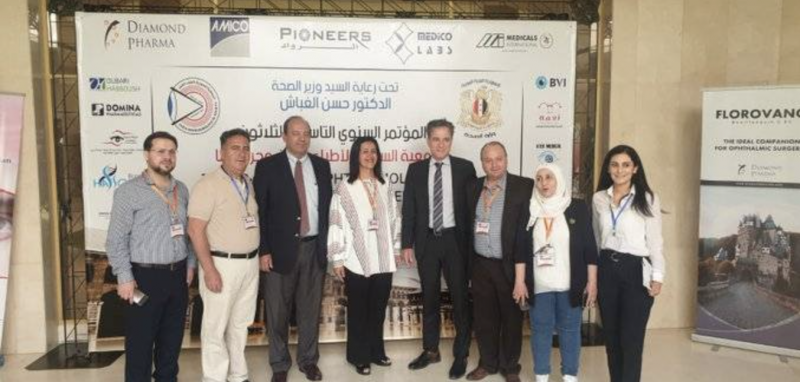
Elias Jaradeh (5th from left) at a conference in Damascus in June. (Courtesy of MP Elias Jaradeh's Twitter account)
In a country like Lebanon, where political polarization is in fashion, especially since the May parliamentary elections, one story is reliable clickbait.
One of the MPs emanating from the protest movement, physician Elias Jaradeh, went to Damascus 10 days ago to attend a conference of Arab ophthalmologists.
This visit caused an outcry on social media, as a significant number of Lebanese look very unfavorably on the Syrian regime, the county’s former occupier, which they accuse of retaining hegemonic ambitions in the country, despite its withdrawal in 2005.
Some social media users accused Jaradeh of participating in normalization with “the butcher Bashar al-Assad ... who regularly violates Lebanese sovereignty.”
Others have even demanded that the MP for Marjayoun-Hasbaya “publicly apologize,” particularly since his election win over the incumbent, Syrian Social Nationalist Party leader Assaad Hardan, was celebrated as a slap in the face to the Syria-aligned camp.
There is talk in the MP’s entourage that the visit was totally apolitical, particularly since this is not the first time he’s participated in this annual conference.
“I am a medical doctor before being an MP, and I will continue to be after my parliamentary term,” he tweeted a few days ago, in a bid to quell the controversy.
Jaradeh brought up the issue again Wednesday, telling al-Jadeed TV, “Once again, my visit was not political, and my priority is and will remain my patients, be they Lebanese or foreigners.”
L’Orient-Le Jour contacted the MP, but he refused to make any further comments.
‘Unforgiving’
What do Jaradeh’s fellow protest movement MPs think of his attending an ophthalmology conference? Speaking to L’Orient-Le Jour, one of these MPs, a former March 14 activist who declined to go on the record, said he did not understand the controversy surrounding his colleague’s trip.
“The question I ask myself” he said, “is why, in a country short on water, electricity or bread, we spend so much energy on such a file?”
“Elias Jaradeh reiterated that his visit was not political, particularly since he regularly attends this conference” he added. “If an MP has family in Syria and he goes there to visit them, will he also be bombarded with criticism?”.
Cynthia Zarazir, a protest movement MP for the Beirut I constituency, known for her firm opposition to the Syrian presence in Lebanon, is of the same opinion.
“I have been involved for years in the struggle for the liberation of Lebanese missing in Syria during the civil war. But I don’t understand this unforgiving argument targeting Elias Jaradeh, when he was simply doing his job as a medical doctor,” she said. “It is really unnecessary to give this much importance to a trivial case.”
Lebanon has not officially severed ties with Syria since the outbreak of the war in 2011, but no high-profile official has visited the country since then. The issue remains extremely divisive, with some advocating full restoration of relations.
In the protest movement, Zarazir said she is convinced that we should not completely sever ties with Damascus. “If dialogue with Syrian authorities is in Lebanon’s interest,” she said, “if it is, for instance, about the fate of the missing Lebanese in that country, then I am in favor of it.”
Jaradeh expressed his point of views on al-Jadded TV Wednesday. “Channels of communication for negotiations are maintained even between enemy states, as is the case with Lebanon and the Israeli enemy right now,” he said. “We are neither at war with Syria nor with its people, so I don’t see why we would burn bridges completely, especially since there are common challenges, such as the massive presence of Syrian refugees in Lebanon.”
A few days ago, Caretaker Minister of the Displaced Issam Charafeddine (close to pro-Syrian Druze figure Talal Arslan) indicated that Lebanon plans to repatriate 15,000 Syrian refugees per month and recommended the formation of a tripartite committee consisting of representatives from Lebanon, Syria and the UN High Commission for Refugees to facilitate the plan’s implementation.
Human rights groups have denounced the initiative, as the Syrian regime arrested several refugees upon their return to the country.
During his interview Wednesday, Jaradeh avoided answering a question concerning why some Syrian refugees fear returning to Syria, and denied having any pro-Damascus political leanings.
“If I advocate political dialogue between two states” he said, “it does not mean that Lebanese leaders should go to Syria to pledge obedience to the regime as they did in the past, a reference to Syria’s 1990-2005 occupation.
This story was originally published in French with L’Orient-Le Jour. Translation by Joelle El-Khoury